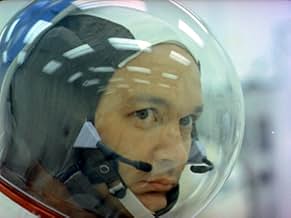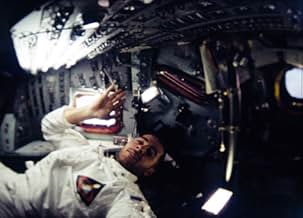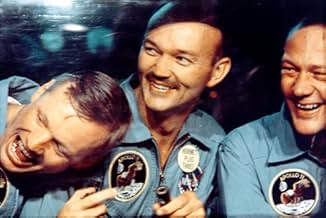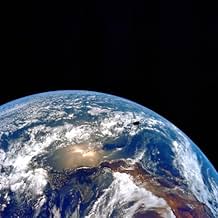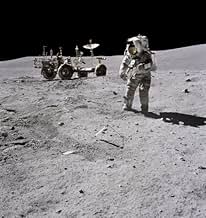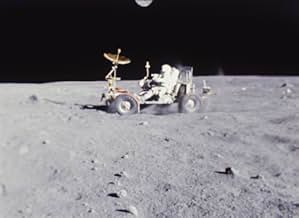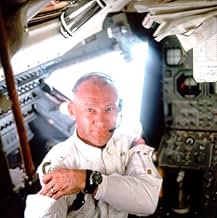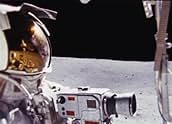AVALIAÇÃO DA IMDb
8,0/10
7,1 mil
SUA AVALIAÇÃO
Adicionar um enredo no seu idiomaThe crew members of NASA's Apollo missions tell their story in their own words.The crew members of NASA's Apollo missions tell their story in their own words.The crew members of NASA's Apollo missions tell their story in their own words.
- Prêmios
- 6 vitórias e 13 indicações no total
Jim Lovell
- Self
- (as James Lovell)
Edgar D. Mitchell
- Self
- (as Edgar Mitchell)
Dave Scott
- Self
- (as David Scott)
William Anders
- Self
- (cenas de arquivo)
Neil Armstrong
- Self
- (cenas de arquivo)
Stephen Armstrong
- Self
- (cenas de arquivo)
Viola Armstrong
- Self
- (cenas de arquivo)
Jules Bergman
- Self
- (cenas de arquivo)
Frank Borman
- Self
- (cenas de arquivo)
Roger B. Chaffee
- Self
- (cenas de arquivo)
Yuri Gagarin
- Self
- (cenas de arquivo)
Avaliações em destaque
Powerfully put together NASA documentary highlights Apollo 11's historic run amongst other aged adventurers often stirring recollections.
Undoubtedly this is some of the finest public extraterrestrial footage ever married into film, and for that alone this noble salute to a bygone America and the heroes that inhabited it is a must see. Taking a trip to the moon with these brave astronauts has never been captured as intimately, helping viewers begin to feel what it must be like to be looking down from space like never before.
Combined with excellent musical scoring, David Sington's emotional remembrance and vicarious lift-offs belongs in many, many star watcher's collections.
Undoubtedly this is some of the finest public extraterrestrial footage ever married into film, and for that alone this noble salute to a bygone America and the heroes that inhabited it is a must see. Taking a trip to the moon with these brave astronauts has never been captured as intimately, helping viewers begin to feel what it must be like to be looking down from space like never before.
Combined with excellent musical scoring, David Sington's emotional remembrance and vicarious lift-offs belongs in many, many star watcher's collections.
Saw this film at Sundance, the screening reserved for the Grand Jury World Documentary Award Winner. Wow! I have seen many of the preceding documentaries on the history of the American space program, the Apollo program in particular. Where this documentary exceeds all previous efforts was in revealing the humanity of the astronauts. Most other documentaries focus on the politics which motivated and technical hurdles overcome in the American space program. David Sington brilliantly uses only the astronauts voices for narration of facts and more with newly released footage from NASA, as well as a lot of footage we've all seen before. Because of the free rein given to the astronauts in the interviews, you see many sides of each revealed. For instance, Mike Collins (who has heretofore rarely been interviewed) reveals wonderful humor and joy in his accomplishments. You find out more about their worries and fears, how they look back on their work and what they were thinking at the time. They are all revealed as nice guys with whom you would want to spend an afternoon.
Strangely absent, but it works well in the end, was Armstrong. He gives virtually no interviews. In a way, having everyone else talk about him is maybe better than him talking.
And, the various conspiracy theories are dealt with in the end credits. This is a great place to do it. In films we sometimes see the end credits used for humorous out-takes, epilogue commentary, and so forth. By dealing with the conspiracy theories in an appended manner during the credits, the film refuses to elevate them to the level of legitimacy that the remainder of the facts and biographical material, yet still dismisses them. The single best dismissal is this: If it was all faked, why did they fake it so many times? Wouldn't once have been enough?
See this film when it comes to your neighborhood theater, as it has been announced as having a distribution deal. It is worth seeing on the big screen for its amazing visuals.
Strangely absent, but it works well in the end, was Armstrong. He gives virtually no interviews. In a way, having everyone else talk about him is maybe better than him talking.
And, the various conspiracy theories are dealt with in the end credits. This is a great place to do it. In films we sometimes see the end credits used for humorous out-takes, epilogue commentary, and so forth. By dealing with the conspiracy theories in an appended manner during the credits, the film refuses to elevate them to the level of legitimacy that the remainder of the facts and biographical material, yet still dismisses them. The single best dismissal is this: If it was all faked, why did they fake it so many times? Wouldn't once have been enough?
See this film when it comes to your neighborhood theater, as it has been announced as having a distribution deal. It is worth seeing on the big screen for its amazing visuals.
10se7en187
I saw this at the Traverse City Film Festival and it was quite the thrill.
Another great documentary about the Apollo program and the astronauts that went to the moon. Some very interesting and inspiring interviews including incredible actual footage of the Apollo 11 mission as it traveled from the Earth to the Moon.
The film contains interviews from many of the astronauts, Mike Collins (the astronaut from Apollo 11 that didn't walk on the moon) was probably the highlight, he was so funny and entertaining. I was a little disappointed that Neil Armstrong wasn't interviewed, but oh well, it was still very good.
Captivating, fun, and an excellent score, I'm sure people will enjoy this well made film.
Another great documentary about the Apollo program and the astronauts that went to the moon. Some very interesting and inspiring interviews including incredible actual footage of the Apollo 11 mission as it traveled from the Earth to the Moon.
The film contains interviews from many of the astronauts, Mike Collins (the astronaut from Apollo 11 that didn't walk on the moon) was probably the highlight, he was so funny and entertaining. I was a little disappointed that Neil Armstrong wasn't interviewed, but oh well, it was still very good.
Captivating, fun, and an excellent score, I'm sure people will enjoy this well made film.
From 1969 to 1972, America put 12 men on the moon in nine missions. Eight of the surviving crew members (notably absent is the reclusive Neil Armstrong) talk about their adventures in the documentary In the Shadow of the Moon with less of the engineering and more of the philosophy, a bit different from the dramatic renditions of The Right Stuff, Apollo 13, and HBO'S From Earth to the Moon.
The excellence of this version is the articulate, close up, talking heads of the astronauts, who are more handsome in their late 70's than they were in their late 20's, a testimony to space athletes who keep themselves fit forever. Besides their reflective narrations (for instance, Mike Collins is full of insights and glamorous details, Jim Lovell could do color commentary for any network), the photography, some of it never seen from NASA archives, is memorable. The earth as blue bubble is beautiful.
The documentary strays somewhat from the reality base by peppering the denouement with sappy, semi-religious contemplations from the narrators about "God's work" and the "fragility" motif. But all in all, this Ron Howard production is a first-rate retrospective about an era for which Americans should be proudthe contrast between the visionary Kennedy and the current blind Bush is painful. Maybe we should send him to the moon?
The excellence of this version is the articulate, close up, talking heads of the astronauts, who are more handsome in their late 70's than they were in their late 20's, a testimony to space athletes who keep themselves fit forever. Besides their reflective narrations (for instance, Mike Collins is full of insights and glamorous details, Jim Lovell could do color commentary for any network), the photography, some of it never seen from NASA archives, is memorable. The earth as blue bubble is beautiful.
The documentary strays somewhat from the reality base by peppering the denouement with sappy, semi-religious contemplations from the narrators about "God's work" and the "fragility" motif. But all in all, this Ron Howard production is a first-rate retrospective about an era for which Americans should be proudthe contrast between the visionary Kennedy and the current blind Bush is painful. Maybe we should send him to the moon?
10Kwp
There have been many documentaries about the technical issues of getting to the Moon, but this one focuses more on how the astronauts felt about it all. At turns funny (Buzz Aldrin admits he relieved himself right before stepping on the Moon because it was about the only spare time he was going to have for the next two hours), inspiring (Jim Lovell talking about reading from Genesis while orbiting the Moon), and poignant (several of the astronauts talk about the Apollo 1 fire), it's a riveting piece of film-making.
The footage itself switches between the "talking heads" of the astronauts and imagery depicting what they're talking about, loosely following the chronology of the space age, from Kennedy's declaration of the ambition to go to the Moon to the later Apollo missions with the lunar rover. There aren't any revelations in the mission footage, but then all that's been combed over many times. However, it's well put together and everything is tied in.
I got to see this film at a special showing at the Goddard Space Flight Center. When the film was over, the auditorium full of space geeks gave the director a standing ovation. I think it was well-deserved. While he humbly noted "It's you rocket scientists who really did this - I just put a film together," perhaps - as he also noted - this film will help inspire another generation as we take the next great leap into space, this time to Mars.
The footage itself switches between the "talking heads" of the astronauts and imagery depicting what they're talking about, loosely following the chronology of the space age, from Kennedy's declaration of the ambition to go to the Moon to the later Apollo missions with the lunar rover. There aren't any revelations in the mission footage, but then all that's been combed over many times. However, it's well put together and everything is tied in.
I got to see this film at a special showing at the Goddard Space Flight Center. When the film was over, the auditorium full of space geeks gave the director a standing ovation. I think it was well-deserved. While he humbly noted "It's you rocket scientists who really did this - I just put a film together," perhaps - as he also noted - this film will help inspire another generation as we take the next great leap into space, this time to Mars.
Você sabia?
- CuriosidadesOf all the astronauts who appeared in the film, only Buzz Aldrin demanded to be paid.
- Erros de gravaçãoThe 1202 alarm was not a programming error in the Apollo Guidance Computer, but rather a hardware design bug, already documented by Apollo 5 engineers. Since the 1202 alarm had occurred only once during testing, NASA decided to go with the radar hardware with known problems instead of using untested newer alternatives with unknown problems.
- Citações
Jim Lovell: We changed our plans on Apollo 8. They changed the mission from an Earth orbital type to a flight to the Moon. And it was a bold move. It had some risky aspects to it. But it was a time when we made bold moves.
- ConexõesAlternate-language version of Universum: Im Schatten des Mondes (2009)
Principais escolhas
Faça login para avaliar e ver a lista de recomendações personalizadas
Detalhes
- Data de lançamento
- Países de origem
- Centrais de atendimento oficiais
- Idiomas
- Também conhecido como
- In the Shadow of the Moon
- Empresas de produção
- Consulte mais créditos da empresa na IMDbPro
Bilheteria
- Orçamento
- US$ 2.000.000 (estimativa)
- Faturamento bruto nos EUA e Canadá
- US$ 1.134.358
- Fim de semana de estreia nos EUA e Canadá
- US$ 38.281
- 9 de set. de 2007
- Faturamento bruto mundial
- US$ 2.161.369
- Tempo de duração
- 1 h 40 min(100 min)
- Cor
- Mixagem de som
- Proporção
- 1.85 : 1
Contribua para esta página
Sugerir uma alteração ou adicionar conteúdo ausente






